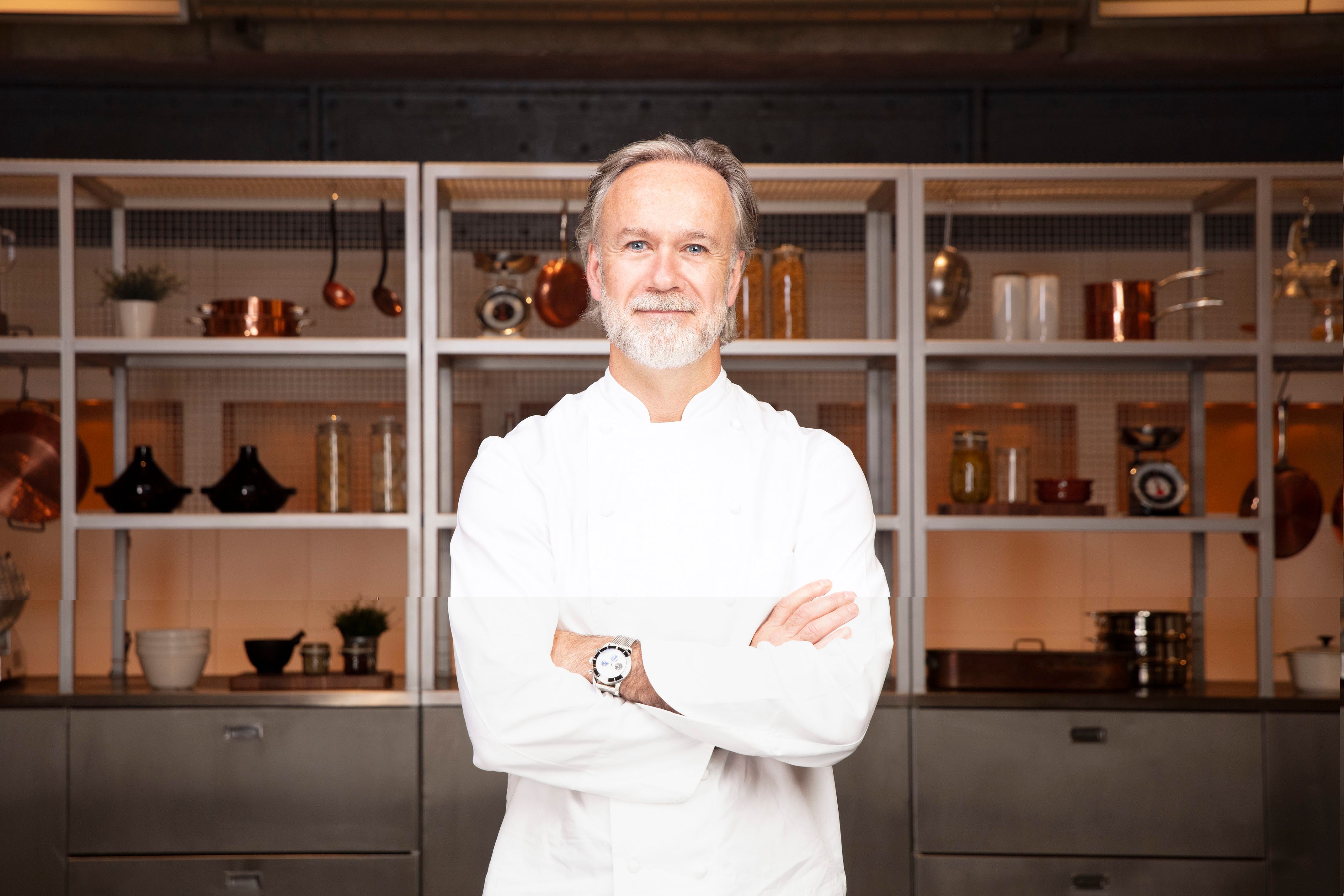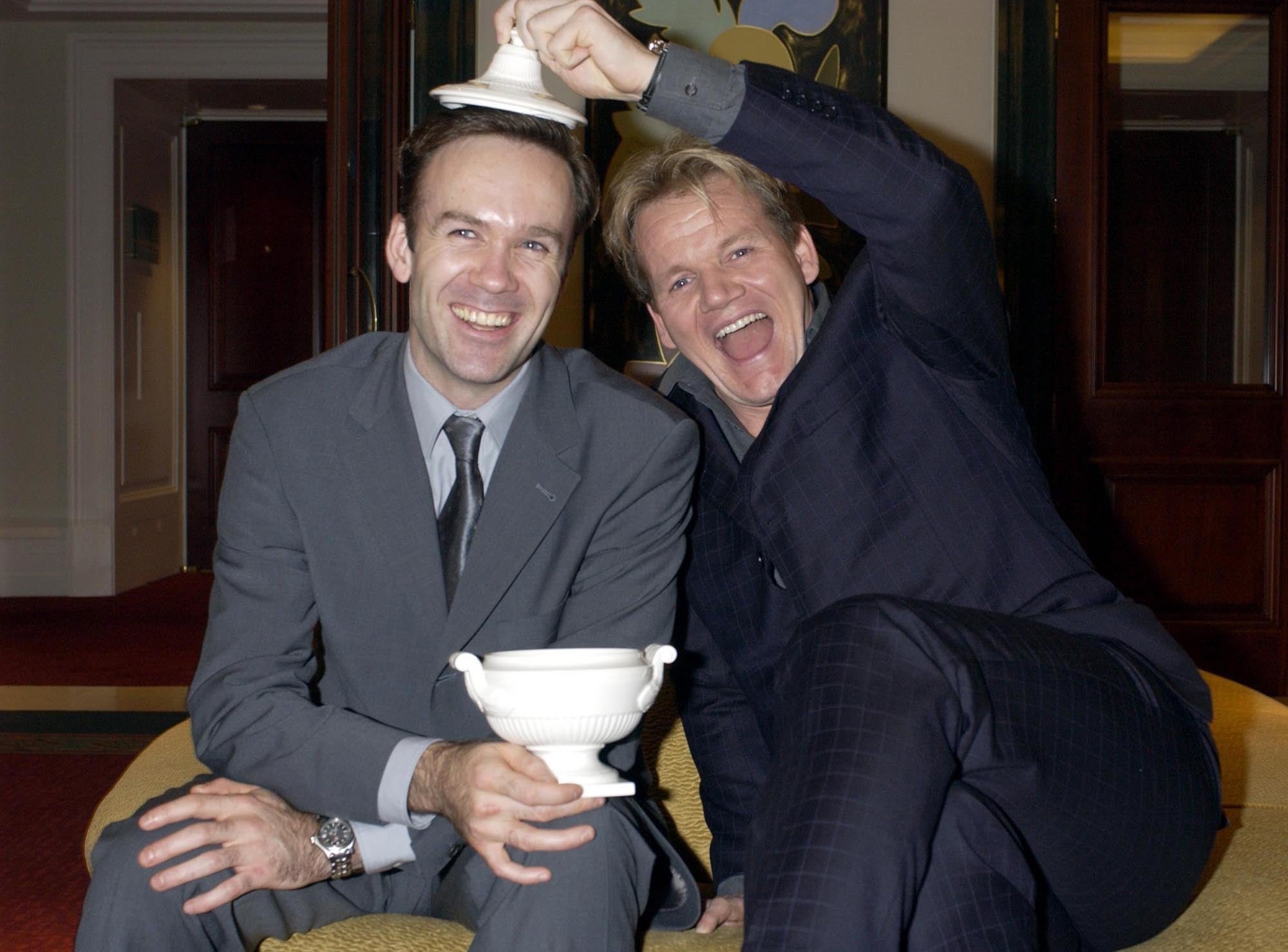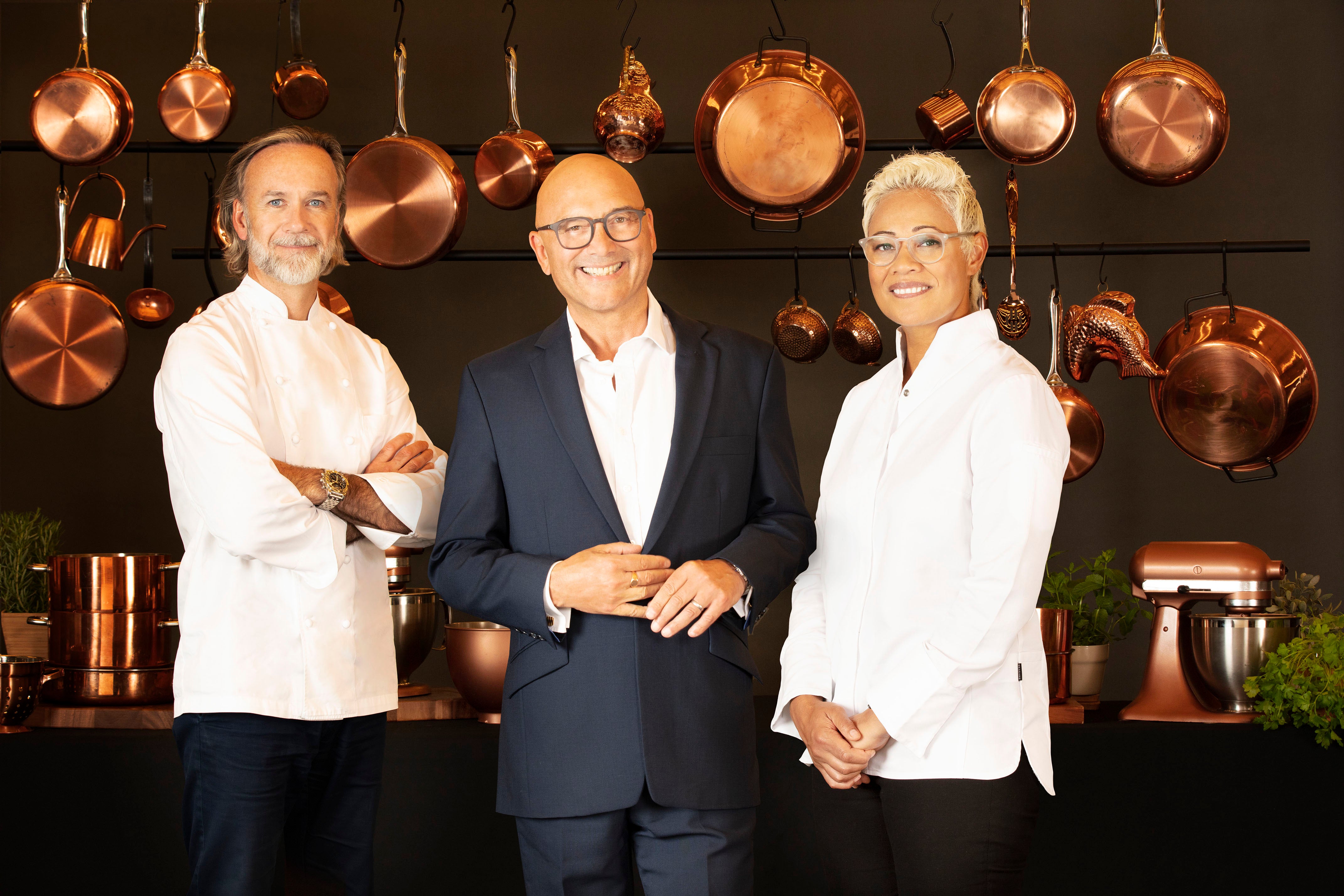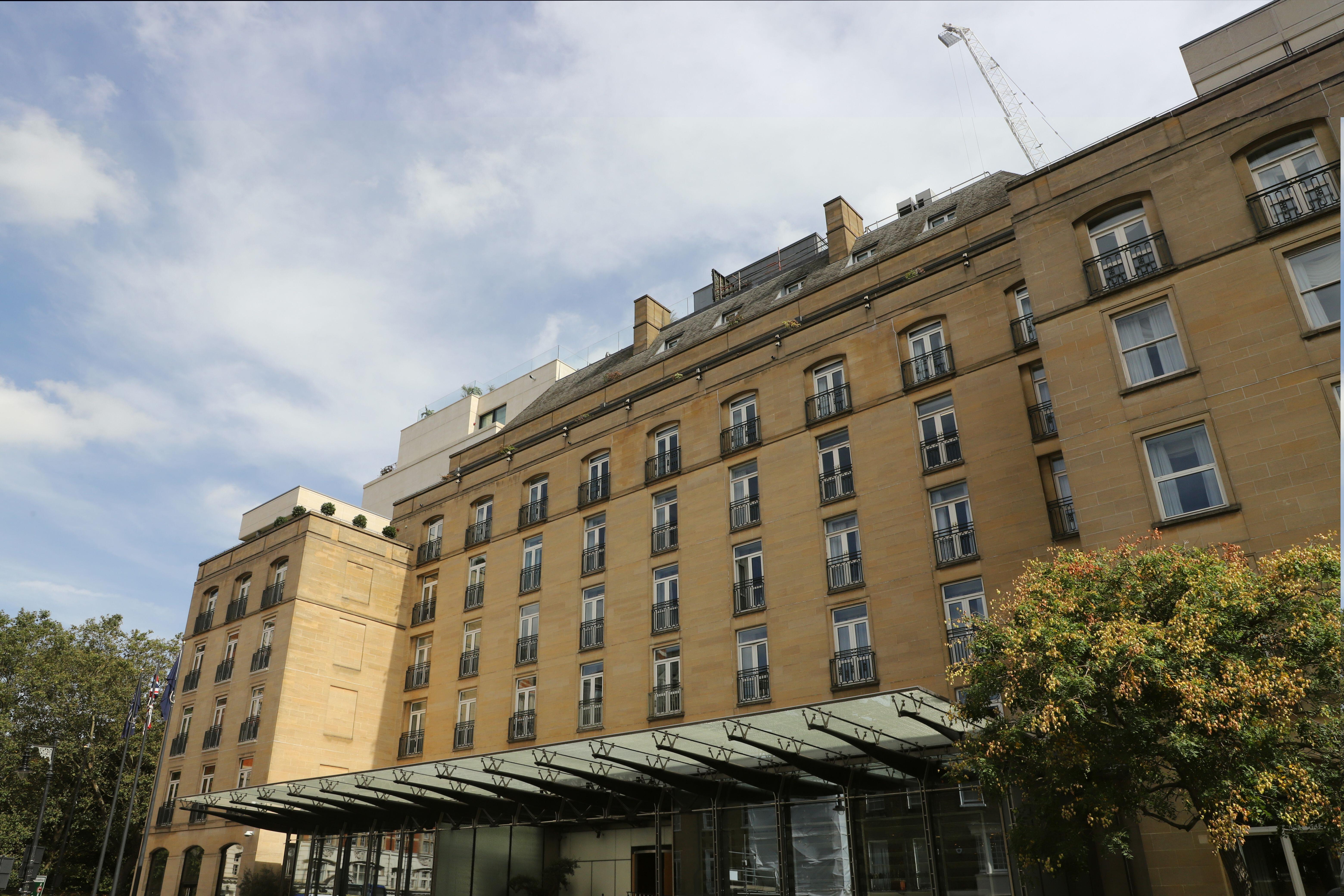Marcus Wareing: ‘Do Michelin stars matter? I love fine dining, but it’s now a very expensive sort of luxury’
After nearly 40 years at the helm of award-winning restaurants, Marcus Wareing has hung up his apron for good. He tells Hannah Twiggs why accolades aren’t what they are cracked up to be, how ‘Masterchef’ changed his perspective and why he quit before his hand was forced


If restaurant openings are 10 a penny, big-name closures must be close to a pound these days.
Recent departures include Michel Roux’s Le Gavroche in January after 57 years of service, Jason Atherton’s Pollen Street after 13, and Monica Galetti’s Mere in April. They cited a better work/life balance, “unsustainably high costs” and the post-Brexit rules savaging the industry.
Most chefs don’t stay away for long. Roux is already back at his old stomping ground The Langham. Atherton has just announced not one but four new projects this year.
What’s more unusual is seeing a chef hang up their apron for good. But Marcus Wareing, who closed The Berkeley on Boxing Day after around 20 years, is ready “for a bit of a break”.
Having gone through the 2008 financial crash, he tells me he could see the current crisis coming from a mile off. Back then, “I’d just launched The Berkeley restaurant on my own [after a legal battle and bitter spat with his former mentor and business partner Gordon Ramsay]. It was very much at the beginning of my independence and nothing was going to stop me from going all the way to the top,” he says. “But to do that, you have to dedicate your life to that cause. You work 16 hours a day, six days a week, year after year after year. I loved those days.”
But after Brexit, Covid and the cost of living crisis, he could see closures on the horizon. “So I made that choice myself, before the economy made it for me.”
Wareing started his career in 1988 at the Savoy Hotel when he was just 18 under chef Anton Edelmann – he later returned to run the Savoy Grill, in direct competition against his former boss. He’s since worked with some of the biggest names in the business, such as Roux at Le Gavroche, where he met Ramsay.

They worked together for 15 years before their falling out over the name of restaurant Pétrus, where Wareing was head chef and ran the restaurant on behalf of Ramsay. Both wanted to keep it but Ramsay eventually won, with Wareing going on to set up his eponymous restaurant at The Berkeley and Ramsay finding global success, earning seven Michelin stars across his restaurants and having hit shows like Hell’s Kitchen and Ramsay’s Kitchen Nightmares.
In February, Wareing described the spat as “the best thing that ever happened to them” as otherwise he would have remained in Ramsay’s shadow and said it was now water under the bridge. He also worked with Daniel Boulud in America and Guy Savoy in France. He earned his first star at 26 at L’Oranger, and another two at his restaurant in The Berkeley, though lost one in 2018. He gave Angela Hartnett her first job.
So it sounds strange to hear a chef whose name is so entwined with the most celebrated names in fine dining ask: “Do the accolades even matter?” He takes the words right out of my mouth. My feeling is that they’ve become so ubiquitous – in 1988, there were only 21 starred restaurants in the UK; now there are 187 – that they’ve lost their sparkle.
After nearly 40 years at the top, he admits everything has changed. “Now you can walk into a really good non-starred restaurant and have the same quality of cookery and service as a fine dining restaurant that just happens to have an accolade.”

“Michelin stars are not the be all and end all of hospitality,” Wareing says matter of factly. “There’s a whole way of dining out now that is making people choose in very different ways. You can eat very well at the low end, as well as you can at the top end, where you’ll pay three times the price.”
He tells me he recently visited a fine dining restaurant – he forgets which one; there’s so many now, they’re almost homogenous – and the bill was £300 a head. “Who’s got £600 in the world today to go and spend on dinner? I love fine dining, but it’s becoming a very expensive sort of luxury.”
And who decides where is good is changing too. While guides like Michelin, AA and Relais & Chateaux have all but died out in their book form, social media is filling the gap.
Wareing knows this firsthand, having found himself at the centre of a bit of good ol’ fun-poking after appearing on TopJaw, the cult Instagram account asking foodies for their insider recommendations, and nominating Pizza Express as the best pizza in London.
“It made the second page of The Times the following day,” he tells me, clearly still flabbergasted. “The funny thing about it is, I don’t troll around London to look for the best pizza. I’ve just eaten so many American hot pizzas [a signature at Pizza Express] with my children growing up. It’s the first restaurant you take your kids to.” He has three children with wife Jane: Jake, 22, Archie, 19, and Jessie, 16. Pizza Express “hardly ever fails”, he says.

The experience taught Wareing an important lesson about how social media is changing eating out. With more than half a million followers on Instagram, TopJaw has quickly become more influential than traditional critics, selling out the restaurants that it features (though perhaps not Pizza Express). Where in the past “to be noticed you were written up by a journalist who told your story”, Wareing believes the lens has shifted from the restaurants and the people that work in them to the influencers talking about them.
“It’s all about TopJaw. It’s not about who they’re are talking to. It’s about them, their style of interview, their style of filming. That’s where it’s changed a little bit,” he says.
With Michelin stars and award rankings are already putting pressure on chefs, social media only adds to it. Wareing started his career in the Boiling Point era of celebrity chef – where they went from screaming in kitchens to screaming on the TV. Plenty of chefs including Andrew Clarke, Rick Stein and Nigella Lawson have been open about their struggles with mental health and industry burnout. Heston Blumenthal, who revealed a bipolar disorder diagnosis last month, has called for a change in attitudes towards neurodiversity in the workplace.
“From a mental health point of view, I think I ignored a lot of it,” he tells me. “There were things that happened and things that were said and there were those pressure cookers in the kitchen. But I just felt it was my job to improve and do better.”
He likens it to being part of a football team. “I don’t believe an Olympian goes to the Olympics, or a football team goes to the European Cup without having people pushing them.” Kitchens are a bit like that, he says.

Being on MasterChef has made him see things in a new light. “When I joined 10 years ago, I was a link in a chain. I wasn’t in charge, I wasn’t the boss. I was part of something,” he says. “You can see the importance of your working community, the youth in the room and how you speak to each other. Remember that you’ve always got a microphone on.” In an industry that has also been beset by allegations from bullying to #MeToo, perhaps that’s a good motto for life inside the kitchen too.
The show reminded him that a kitchen is the sum of its moving parts. “When I worked at Le Gavroche, the most important person that Albert [Roux] had in his kitchen wasn’t us. It was the kitchen porter.
“They were as important as the food, the chefs, even Michel [Albert’s son]. That was one of my very first lessons. Cooks go to the pot wash and throw things in and look at the kitchen porter as a real point of difference. And they’re not, they’re an equal part of that chain, like I was on MasterChef.”
That’s partly why he says he has joined P&G as a brand ambassador. “One thing I’ve learnt over the years is if you buy quality, it does last longer. If we buy the best ingredients, then we should also buy the very best cleaning products.”
This new chapter of his life and career has given him perspective on the past. “It’s helped a lot to be able to understand why I’ve done the things that I’ve done,” he says. “It’s not just about me, it’s about this whole group of people.”
And while he might have hung up his apron (it’s always safer to suffix that with “for now” in this industry), he’s hardly resting on his laurels. He’s two-thirds of the way through filming the next series of Masterchef, he’s writing his 10th cookbook, his chef training programme with Compass has just won an award and he’s got a TV show coming out on Food Network about Mallorca.
“I’ve never been a globetrotter. I’ve never travelled for food. The only time I’ve ever travelled was to take my family on holiday,” he says. “My journey in television is about my own education in the world of food.”
I suppose even Michelin-starred chefs have more to learn.
Join our commenting forum
Join thought-provoking conversations, follow other Independent readers and see their replies
Comments
Bookmark popover
Removed from bookmarks